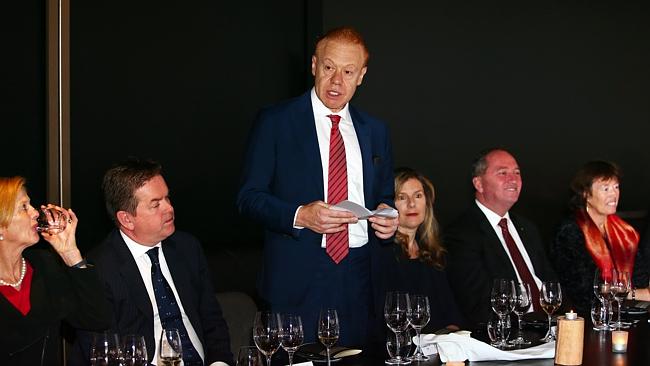6 August 2015
Sue Neales
The Australian
Australia’s largest privately owned beef company has warned the federal government that its crackdown on foreigners buying residential property and farmland is scaring away foreign investors, particularly the Chinese.
Consolidated Pastoral Company chief Troy Setter issued a warning to Agriculture Minister Barnaby Joyce during this week’s Global Food Forum dinner in Melbourne that foreign capital was “walking away” from deals because of recent disturbing government decisions.
But Mr Joyce said he was not opposed to foreign investment in agriculture in general, but repeated his insistence that tougher limits must be placed on foreign governments or state-owned companies buying Australian land. “State-owned enterprises make life difficult; no matter what you think on foreign investment in general,” the Agriculture Minister and Nationals deputy leader told the forum, hosted jointly by The Australian and Visy.
“You have to ask yourself, is there any line in the sand that you have in regards to how much of our nation can be owned by another nation and, if there is a line, what are its attributes and how much is too much?”
The Abbott government has recently tightened restrictions and threshold limits on all foreign purchases of agricultural land, largely in line with the election platforms of its Coalition partner, the Nationals.
Foreign Investment Review Board approval is now required for all farm deals once a foreign company owns or plans to buy Australian agricultural land worth more than $15 million.
Joe Hockey also shocked foreign investors buying residential property in March when he ordered one of China’s richest businessmen, billionaire Xu Jiayin, to dispose of the prized Port Piper mansion Valle de Mare that he had bought through a string of shelf companies a month earlier for $39 billion, because he had not sought or received FIRB approval.
Mr Setter, who runs the $700m CPC and its 20 outback stations and 375,000 head of cattle on behalf of British-based private equity major Terra Firma, said his company had already seen and experienced the flow-on downside of both government policies. “We are a 95 per cent foreign-owned company that runs cattle on land that is 1.5 times the size of Switzerland; we need to bring in new capital to Australia to grow our business,” Mr Setter said.
“But that foreign capital has a choice (about where it invests) and, with a fair bit of confusion with FIRB, we are now seeing people we’ve been working closely with who have decided not to invest in Australia.
“There is no doubt whatsoever this issue with the house in Sydney has turned off some substantial-sized Chinese bidders, and there are other private investors who only have an opportune window of time to invest, who the delays with FIRB (approval process) have seen them walk away.”
The debate comes at a critical time as 30 bidders, including many foreign-owned companies, state-owned enterprises and Chinese groups, have just submitted their final $300m-plus offers for the iconic family-owned Sidney Kidman chain of cattle properties, including the world’s biggest rural holding, Anna Creek Station near Lake Eyre.
Labor industry spokesman Kim Carr told the forum the Labor Party was neither hostile nor opposed to foreign investment, or its origins, as long as it helped build capability. “The critical issue is national interest, and it should be determined in each and every case,” Senator Carr said. “Whether or not the Chinese buy the Kidman properties has to be looked at, at the time; I wouldn’t automatically say no just because they are Chinese — but would it be in the national interest?”
Mr Setter appealed to Mr Joyce to consider changing or relaxing the tighter new $15m threshold and some of the constraints associated with it, which now force a foreign-owned company like CPC to seek FIRB approval every time it wants to buy even the smallest new block of farmland or lease an extra property.
He said the 30-day FIRB approval process was restricting companies like CPC being “quick and nimble” when they needed to buy new cattle properties, and hampering the development of northern Australia.
Mr Setter said the usual advertised period for a sale through a rural estate agent was just 40 days, allowing little time for thorough due diligence on the business acquisition before a FIRB application for each single proposed purchase had to be submitted.
“We are struggling; there are good opportunities where we have had to sit back and say it is just too hard at the moment; where we just haven’t had the time (because of FIRB),” Mr Setter said. “It is particularly distressing when we have stressed vendors who have banks breathing down their necks or who want to sell ahead of receivers being appointed — and we want to help them out — but the short window of time means we cannot act as we would like to.”
Mr Joyce said the tightened restrictions were a consequence of the public asking for a crackdown on foreign investment, in relation to both city homes and farms.
But he said the government review of the amount of foreign investment pouring into Australia, particularly from China, was not tantamount to further restrictions, and also said it was possible some of the planned tougher FIRB curbs related to foreign companies buying farms could be further adjusted. Mr Joyce argued that to raise and debate these issues did not make him or anyone in the government racist or a xenophobic.
“It’s infuriating and banal when people say when you raise the question, you are therefore a xenophobe. I’m not opposed to foreign investment and (on residential property) my position is we can keep building houses, so it’s not going to be a problem (if Chinese investors buy them). But prime agricultural land is different; it’s a finite resource and the one asset there is never going to be any more of in the world; it’s all we’ve got.”

Courtesy of The Australian
